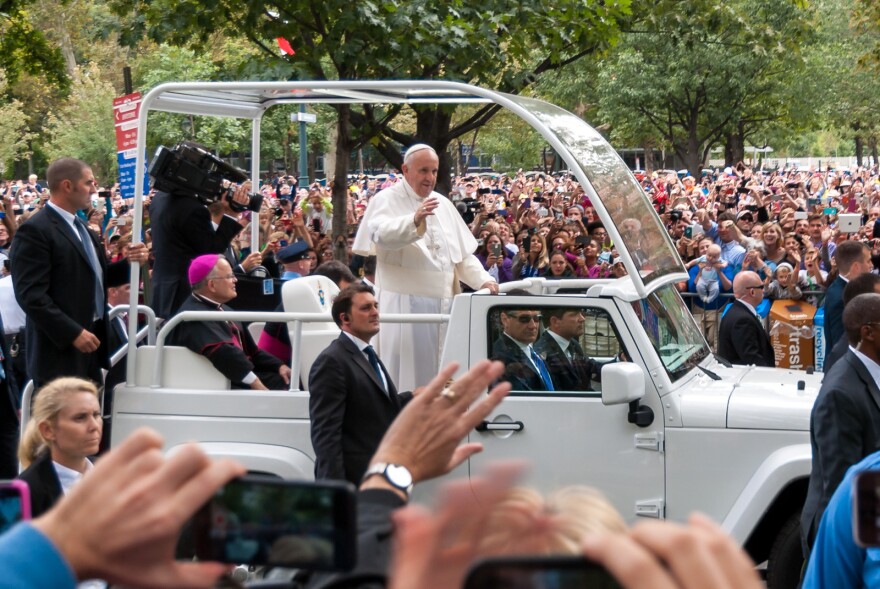Pope Francis’s visit to the United States and Cuba has passed into history. Its impact is still being felt – but Lake Effect essayist Art Cyr says in looking at history, there are other milestones we should examine to understand the intersection of Catholicism and Western politics:
“An eye for an eye, and a tooth for a tooth…,” is a useful starting place for discussion of the influence of Pope Francis during his historic visit to the Americas. To modern readers, the Biblical quote (Exodus 21:24) may seem cruel and brutal, but the Old Testament sentiment actually meant revolutionary progress.
Ancient warfare involved unrestrained killing and pillaging. By contrast, this Hebrew law codified proportionality and restraint. Likewise, the Roman Catholic Church historically represents humanitarian progress, an essential point often overlooked in the economically advanced economies and increasingly secular societies of the world.
The visit of Pope Francis to Cuba and the United States underscores the political influence of the Catholic Church. He is the first pope from the Americas, and the first from the intellectual Jesuit order.
Cuba remains an extremely efficient and effective Communist dictatorship. The secret police has a long-established – and extremely well deserved – reputation for acuteness in sensing danger, and ruthless brutality in eliminating threats.
Yet ruling brothers Fidel and Raul Castro had no choice but to meet with Pope Francis, welcome him graciously and treat him with respect. The Pope for his part walked a careful rhetorical path, yet spoke out for freedom and tolerance. Understandably, he did not meet publicly with dissidents.
However, Francis’ message is clear, and impact of the visit may prove profound. During the Cold War, Pope John Paul II provided historic leadership in foreign policy. He supported Solidarity, the successful trade union-based reform movement in his native Poland. That in turn contributed to the fall of the Soviet Union and satellite states.
The essential Christian message emphasizes compassion, and the Catholic Church over centuries has played a vital role in relief of hunger, poverty and human misery, and inrtt promotion of human rights. The cumulative positive impact is profound among the approximately one billion Roman Catholics currently on the planet, and well beyond.
Today, hunger and poverty have been overcome for the great majority in industrialized nations, and political controversies there have generally focused on other topics. Francis is with political reformers on the left regarding the environment and capital punishment, with political conservatives in opposing gay marriage.
Shocking criminal sexual abuse by priests is a principal contemporary challenge. Earlier this year, a tribunal was established to review and judge cases of sexual abuse. Francis’ predecessor Benedict XVI publicly acknowledged the criminal behavior. He met with victims, and apologized publicly.
Historically, the Catholic Church has successfully pressed for restraint in war, reflecting the proportionality cited in Exodus. German Pope Benedict was extremely inspiring during a 2006 visit to Auschwitz. He confessed the limitations of language to describe the Holocaust.
Contemporary analysis of ethics and military strategy is led by Catholic scholars such as J. Bryan Hehir, a senior priest and faculty member at the Kennedy School of Government at Harvard University.
During the Cold War, Fr. Hehir guided the U.S. Catholic Bishops’ influential report on use of nuclear weapons. Such work continues after the Cold War. Hehir also bluntly criticized his church for mishandling sex abuse crimes by priests.
In the U.S., Pope Francis has the opportunity to speak in the open air of democracy. He is the first pope to address Congress.
In 1960, John Kennedy in seeking the White House successfully confronted – and defeated - anti-Catholic prejudice. Numerous Catholics since have successfully run for national office, including Vice President Joe Biden.
Essayist Art Cyr is a professor of political economy and world business and director of the Clausen Center for World Business at Carthage College in Kenosha, author of “After the Cold War,” and Lake Effect contributor.







